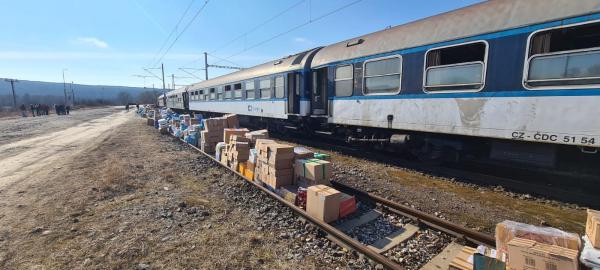Within a day of Russian troops entering Ukraine in February, Rotary clubs in the Czech Republic and Slovakia were using their connections to gain access to a strategic railway hub that has allowed them to shuttle critical supplies into Ukraine and help refugees get out.
The city of Košice, Slovakia, about 100 kilometers (60 miles) from the border with Ukraine, is home to a rail terminus where east meets west. For decades, the terminus has received trains carrying raw materials out of Ukraine along wide-gauge rail lines. The cargo is then transferred onto train cars that run on the standard-gauge rail lines used elsewhere in Europe.
A number of multinational shipping companies use the hub. Rotary members realized quickly that they needed to be able to use it as well.
Martin Pitorák, president of the Rotary Club of Košice, is a former vice president of U.S. Steel Košice, which uses the hub. He and Michal Sláma, president of the Rotary Club of Pardubice, Czech Republic, were among Rotary members who were able to negotiate access.
“We acted very quickly,” says Monika Kočiová, a member of the Rotaract and Rotary clubs of Košice. “We were making arrangements while others were still knocking at the door.”
The hub is important because Ukraine’s extensive rail network, one of the largest in the world, serves parts of the country that are difficult to reach by truck.
Rotary was the first humanitarian organization to get permission to use the rail hub for relief supplies, Kočiová says, and clubs have sent trains full of medical supplies, nonperishable food, and hygiene products across the border. The Slovak government and the European Union have since designated the hub as a primary pathway for sending supplies by rail into Ukraine.
Supplies that arrive in Košice are unloaded and sorted by Rotary volunteers into warehouses before being moved into Ukraine. The Rotary and Rotaract clubs have also used more than 60 trucks and buses to carry 740 tons of supplies into the western Ukrainian region of Uzhhorod, just across the border. From there, they are distributed to locations around the country.
“It is great to see the power of Rotary at work in this time of need,” says Pitorák. “In addition to supplies, financial support is coming in from many parts of the world.”
Railway Helps
In addition to the use of the wide-gauge rail network, the Rotary and Rotaract clubs are part of an initiative called Railway Helps. Started by the owner of Gepard Express, a Czech passenger transportation company, Railway Helps is using passenger trains to bring supplies into Ukraine and refugees out.
So far, the initiative has brought more than 500 tons of supplies into Chop, a town in the Uzhhorod region. Trains returned to the city of Pardubice carrying more than 5,500 Ukrainian refugees.
Rotary members have helped raise funds, which have come from a variety of sources including a public fundraiser, district funding, and a contribution by the owner of Gepard Express. The participating railways have also absorbed significant costs and other organizations have waived fees.
Sláma continues to seek additional funds for Railway Helps, which is currently sending trains through Poland to Mostyska. The plan is to eventually build a waiting room and passenger station at Mostyska to speed up the flow of supplies and assist refugees leaving Ukraine.
Working with others
Coordinating with other entities has been crucial to the success of the efforts. The Rotary and Rotaract clubs have been working with Ukrainian government officials, including members of parliament, diplomats, and regional governors, as well as with hospitals in the cities of Kharkiv, Cherkasy, Uzhhorod, and Mukachevo.
Kočiová and Ivana Lengová, both members of the International Fellowship of Healthcare Professionals, oversee the purchase of medical supplies and the processing of medical equipment donated by companies in Europe. Lengová, a member of the Rotary Club of Košice Classic, helped secured equipment worth more than $730,000 from Siemens Slovakia, including four mobile imaging units and three mobile X-ray units.
“Because the fellowship includes members who work at Ukrainian hospitals, we have been able to react very quickly to changing needs,” Kočiová notes.
The clubs are also in regular contact with officials and volunteers at several Slovak-Ukrainian border crossings, coordinating accommodations and transportation for refugees.
Just four days after the war began, Kočiová spent time at the border.
“You could feel a lot of pain and see tears,” she says. “The refugees are broken, but they are very strong and proud. They were not asking for anything. Even the small children were not complaining.”
Kočiová was away from home on a business trip when the war began, but when contacted by a Ukrainian friend and fellow Rotaractor, she arranged for her to stay at her home.
“I arrived home a day later and saw her with just one small backpack containing all she had,” Kočiová says. “She is a high-level manager. Her mom was escaping along another route, and her sister yet another, and they were planning to meet up in Switzerland. When you imagine yourself in that situation, it becomes very real.”
